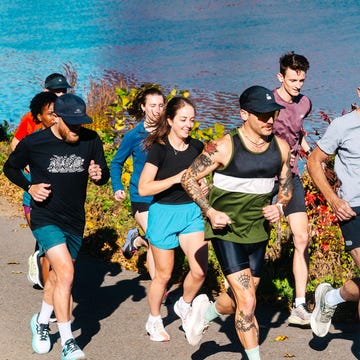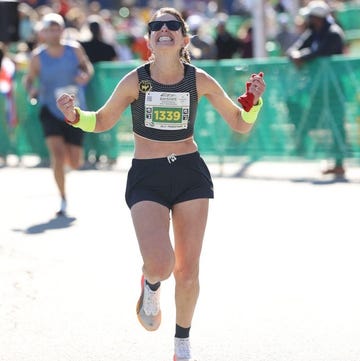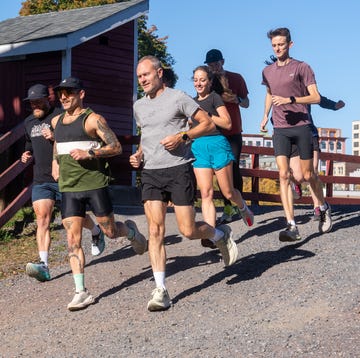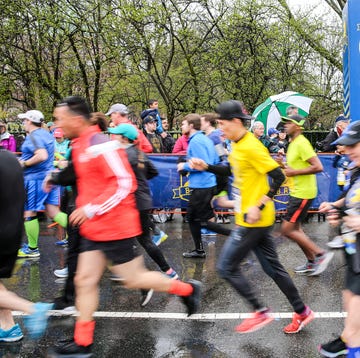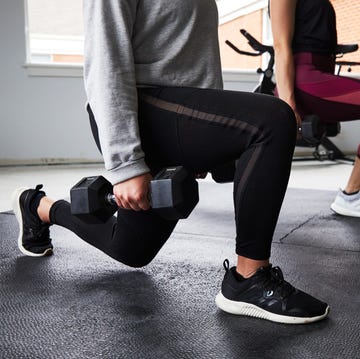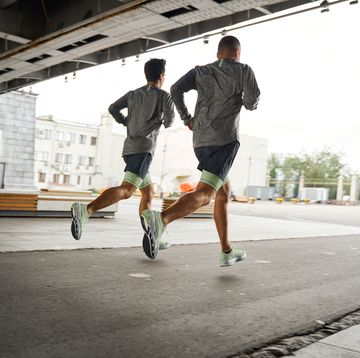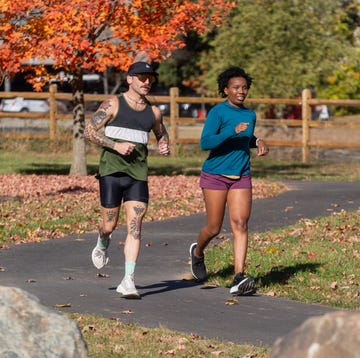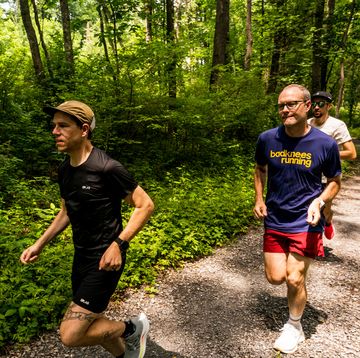My one carry-on and six personal items are stashed in the overhead compartment. The seat pouch in front of me is crammed with the tools necessary to get us through a 13-hour flight back from Australia to Oregon: bottle, rice puffs, squeezy food packs, diapers, Picky Bars, rubber-boat teething ring, torn-up copy of Brown Bear. My legs feel as battered as pier pilings after a storm, but my arms are relatively fresh and ready for baby wrangling. Jude lurches toward Dude Onplane next to me, who looks on the verge of requesting a seat change.
Dude is wearing Brooks Adrenalines, so I figure there's a 90 percent chance he's a runner. I myself am in heavy disguise with my pajamas, slippers, and baby on. Dude would never guess I was a professional who just competed in an international 5K at the Sydney Track Classic. I strike up a conversation. He tells me about his marathons, his injuries, his struggles maintaining motivation, his goals. I chime in, and Dude's eyes light up with excitement. "You know a lot about this stuff! You run marathons, too?"
&Shoes & Gear
Wah-wah.
Mr. Onplane is visibly less impressed. Fair enough. Anyone can run 3.1 miles. "I started out running 5Ks, too," he says. "Keep at it, you'll get there."
I find myself wishing I could give him insight into the intricacies of a short race run bravely. How nervous I was to run a 4:50 first mile with the lead pack, in my first 5K since the 2012 Olympic Trials, knowing I hadn't trained hard enough postpartum to maintain it. I want to talk about how, with three laps left, my body felt engulfed in flames, and how alive that feels compared with the slow burn of the marathon. I want to discuss the final laps when the pack had broken me, and I had to ask myself, Nutrition - Weight Loss? Health & Injuries No, making myself try harder for no other reason than that trying hard matters. But I'm too tired to make an enthusiastic case, and besides, Jude has exploded a canister of puffs.
With a growing obsession over distance races, and a focus on completion rather than competition, 5Ks have somehow lost a lot of their badassiness. They have become little more than a gateway drug for marathons. The prevailing mentality is to go longer and longer and longer, until one day you find yourself down six toe-nails, dressed head to toe in compression gear, contemplating your first 50-K ultra over a morning bowl of chia seeds. Stop! Listen to me.
The 5K is freaking awesome. It encourages you to develop a combination of endurance, speed, and strength. You can train for it and still have a life. You can race one every weekend and still be able to walk normally. If people ran more 5Ks, I'm positive the average life satisfaction of humans would increase dramatically.
It's time for a 5K Revolution! Join me, and we can all feel the fulfillment that comes with an increase in energy, wealth, and free time. May your competitions provide endless opportunities for smack-talk sportsmanship, and may your medal racks collapse from the hardware earned by flirting with the edges of your potential. And for the love of Pete, may Dude On-plane one day understand the endeavor that is 5000 meters. Here are Lauren Fleshman's top ten reasons that you should spend a year focusing on the 5K:
10. Fitness
Shorter interval work is more effective than long-distance runs for weight management and gaining fitness. Interval training won't set you up to run a great marathon, but it will make you a baller at the 5K, an event that requires strength, speed, power, and endurance combined. By making the 5K your focus, your training plan will actually line up with what's best for your overall health. Excuse me, what? Yes.
9. Travel
With 5Ks being readily available within driving distance, you don't have to fly around the country to do one. Racing is a cool excuse to travel, but you know what's even better? Traveling without racing. You can actually walk places and see things without limping, eat whatever you want, and spend a significantly smaller portion of your trip on the toilet.
8. Doctors' Bills
Overuse injuries go hand in hand with marathon training. Sure, you can get injured doing 5Ks too, but with less overall mileage and workouts that involve a greater variety of paces, you'll be more likely to stay healthy. More running days per year = happy runners with more money = a healthy global economy = World Peace.
7. Free Time
What will you do with your weekends when you aren't destroyed from running three-and-a-half hours?
6. Nipple Health
Does Running Burn Fat.
5. Budget
5Ks are cheaper, and you still get a stale bagel and a green banana and only have to run one-eighth as far.
4. How I Broke a 3:30 Marathon After a Long Break
The satisfaction in a marathon comes with completion under duress. You reach the point where you aren't sure you will finish, and then somehow you do. It's an amazing feeling, but it's only one way to experience racing. In a 5K, you know that you are going to finish. Satisfaction comes instead from competing: against yourself, the clock, and others in an intense, concentrated period of time. This adds a whole new depth and richness to your running, regardless of your speed.
3. Mulligans
Getting derailed in a marathon due to inclement weather, travel mishaps, poo-poo problems, or just having an off day can cost you 16 weeks of training and traveling somewhere far away for another attempt. If you screw up the 5K, you can just get in your car and try again next week. Boom.
2. The Humanity
When you hit the wall in a 5K, it hurts a lot, but it's over faster than it takes to make a cappuccino. Literally. I timed it.
1. Style
No fuel belts. No water bottles. No gels or blocks or powders or bars. No shorts with 30 pockets. No Vaseline stains. You can run a 5K in jorts with nary a chafe. 5K for the win. Who's with me?
* * *
Follow Lauren Fleshman, a pro runner with Oiselle and cofounder of Picky Bars, on Twitter @laurenfleshman.






